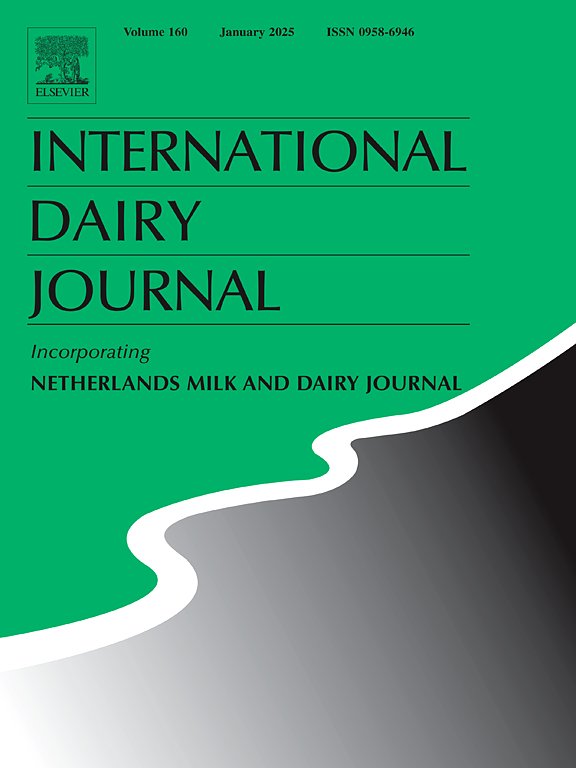Whey protein and probiotic supplementation ameliorates DSS-induced colitis in mice
IF 3.4
3区 农林科学
Q2 FOOD SCIENCE & TECHNOLOGY
引用次数: 0
Abstract
The impact of combined supplementation with whey protein (0.2 g kg−1 body weight) and Lacticaseibacillus rhamnosus GG (8 log CFU/day) on dextran sulfate sodium (DSS)-induced colitis in C57BL/6J mice (n = 10 per group) was assessed in this study. Animals were assigned to four groups: C, healthy control; CL, colitic without supplementation; CS, colitic with whey protein; and CSP, colitic with whey protein and probiotic. Daily intake of whey protein, alone or in combination with the probiotic, reduced weight loss, preserved the colon weight-to-length ratio, and alleviated colitis symptoms, as assessed by the disease activity index (DAI). Histological analysis showed that the combination of whey protein and probiotic (CSP) significantly reduced inflammatory infiltration. Assuming this mouse model is representative of human conditions, these findings suggest that whey protein, either alone or in combination with the probiotic, may offer an effective non-pharmacological approach for managing colitis by modulating immune responses and inflammation.
补充乳清蛋白和益生菌可改善dss诱导的小鼠结肠炎
本研究评估了乳清蛋白(0.2 g kg - 1体重)和鼠李糖乳杆菌GG (8 log CFU/天)联合补充对C57BL/6J小鼠(每组10只)葡聚糖硫酸钠(DSS)诱导结肠炎的影响。动物被分为四组:C组,健康对照组;CL,未补充的结肠炎;CS:乳清蛋白结肠炎;和CSP,乳清蛋白和益生菌的结肠炎。根据疾病活动指数(DAI)的评估,每日摄入乳清蛋白,单独或与益生菌联合,减轻了体重减轻,保持了结肠的重量与长度比,并缓解了结肠炎症状。组织学分析显示,乳清蛋白和益生菌(CSP)联合使用可显著减少炎症浸润。假设这个小鼠模型是人类条件的代表,这些发现表明,乳清蛋白单独使用或与益生菌联合使用,可能通过调节免疫反应和炎症来提供有效的非药物方法来治疗结肠炎。
本文章由计算机程序翻译,如有差异,请以英文原文为准。
求助全文
约1分钟内获得全文
求助全文
来源期刊

International Dairy Journal
工程技术-食品科技
CiteScore
6.50
自引率
9.70%
发文量
200
审稿时长
49 days
期刊介绍:
The International Dairy Journal publishes significant advancements in dairy science and technology in the form of research articles and critical reviews that are of relevance to the broader international dairy community. Within this scope, research on the science and technology of milk and dairy products and the nutritional and health aspects of dairy foods are included; the journal pays particular attention to applied research and its interface with the dairy industry.
The journal''s coverage includes the following, where directly applicable to dairy science and technology:
• Chemistry and physico-chemical properties of milk constituents
• Microbiology, food safety, enzymology, biotechnology
• Processing and engineering
• Emulsion science, food structure, and texture
• Raw material quality and effect on relevant products
• Flavour and off-flavour development
• Technological functionality and applications of dairy ingredients
• Sensory and consumer sciences
• Nutrition and substantiation of human health implications of milk components or dairy products
International Dairy Journal does not publish papers related to milk production, animal health and other aspects of on-farm milk production unless there is a clear relationship to dairy technology, human health or final product quality.
 求助内容:
求助内容: 应助结果提醒方式:
应助结果提醒方式:


